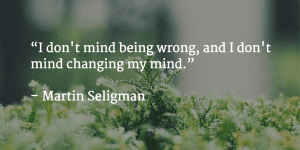Learned Optimism Summary
Curated from: fourminutebooks.com
Ideas, facts & insights covering these topics:
20 ideas
·8.65K reads
45
1
Explore the World's Best Ideas
Join today and uncover 100+ curated journeys from 50+ topics. Unlock access to our mobile app with extensive features.
Learned Optimism - Book Summary
Learned Optimism digs into why optimists are healthier, happier, and more successful people than pessimists, how both are learned attitudes and what you can do to become an optimist yourself.
42
663 reads
Author Quote
"I don't mind being wrong, and I don't mind changing my mind."
-Martin Seligman
49
771 reads
Book Overview
Do you see some people in your life who just seem to have everything fall into their lap? Who master life as if in cruise control mode, where everything works on autopilot and is super easy?
I know I do.
Martin Seligman , the father of positive psychology, has spent decades of research trying to find out why some people maneuver through their lives so easily.
His answer: They’re optimists .
40
555 reads
1st Characteristic In Which Optimists Different From Pessimists
1. Optimists see problems as temporary, pessimists as permanent . Sticking with the example from Mindset , if optimists spill their coffee they won’t say “I always spill my coffee and ruin my clothes.”, but rather “I spilled my coffee this time , but I won’t spill the next one.”
46
585 reads
2nd Characteristic In Which Optimists Different From Pessimists
2. Optimists see problems as specific to a situation, pessimists make them a general case. Being on a team assignment where one person doesn’t deliver their part, a pessimist is likely to say: “This team sucks.” and write off the entire team as lazy. An optimist would say: “One person is not very helpful, but I’m sure the rest of the team will do great work.”
41
541 reads
3rd Characteristic In Which Optimists Different From Pessimists
3. Optimists see problems as externally caused, pessimists blame themselves. When getting a divorce, both people will think one of them is the major cause. An optimist will always attribute the failure to an external source, in this case, their former spouse (“He never wanted kids anyway”). The pessimist is likely to blame herself (“I never made time for her that’s why she left me).
40
490 reads
Book Review
Luckily, both styles are acquired and can be learned.
Until now your explanatory style has been shaped primarily by your parents and your teachers in school.
Have you ever heard a teacher yell at someone for chatting in class? That’s good, because it’s an external problem they point to. “You have to listen more closely next time.” is a much better statement than “You’re just a bad reader.” because the latter makes the student internalize the problem.
One of the advantages of being an optimist is being healthier.
39
410 reads
What’s more, optimists are likely to take good care of their bodies, because they believe that their choices will make a difference. Pessimists are prone to junk food and no exercise, as they believe it won’t matter.
On the other hand, pessimism can likely be a cause of depression . Believing that nothing you do will change anything can of course make you depressed. A study where people had to press buttons to make noises stop found symptoms of depression in them whenever the experiment was rigged so that the buttons had no effect.
41
404 reads
Optimism is also a deciding factor in professional sports . Seligman looked at baseball teams in 1985 and determined the New York Mets were the most optimistic team , the St. Luis Cardinals the most pessimistic. Guess who won the World Series one year later? The Mets.
38
365 reads
Talent at work is just as overrated as talent in professional sports . The University of Pennsylvania usually assesses their freshmen according to their SATs, high school grades and achievement test. When they let Seligman segment the new students into optimists and pessimists, it turned out that the optimists exceeded expectations, where pessimists fell behind.
39
354 reads
That same optimism will also carry you through a successful career , as Seligman’s study with Metropolitan shows. He hired people for them who underperformed skill-wise, but showed great optimism. The new employees outperformed even those with better skills.
38
337 reads
So what can you do to become an optimist as quickly as possible?
Use the ABC technique by Albert Ellis .
39
337 reads
43
328 reads
How you decide to deal with a negative event determines almost entirely how much it will affect you. That’s why it’s important to start recording your ABCs and seeing where you can change your beliefs.
Once you’ve recorded a few negative believes, start challenging them. Ask yourself if they’re really true, whether there’s another explanation and if they’re true, what that implies.
42
323 reads
Then you can start labeling your thoughts into two categories: useful and not useful . Whenever you notice a thought is not useful to you, then you should probably not pursue it any further.
Start thinking of negative events as temporary, specific and external, record your ABCs and know that your attitude is learned – you can change it at any time.
This way, you’ll be well on your way to becoming a true optimist.
42
291 reads
Learned Optimism - Book Review
Learned Optimism is so packed with actionable advice and great insights, it’s hard to condense it any further.
I’m a big fan of positive psychology and this book intersects a lot with Mindset by Carol Dweck , but is much more encompassing.
40
297 reads
Who would I recommend the Learned Optimism to?
The 23 year old soccer player whose coach always makes excuses why their team loses, the 19 year old graduate who’s worried that her resumé is not perfect and anyone who keeps complaining about what’s in the newspaper.
38
307 reads
IDEAS CURATED BY
CURATOR'S NOTE
Learned Optimism - Book Review
“
Tom Joad's ideas are part of this journey:
Learn more about motivationandinspiration with this collection
How to delegate tasks efficiently
How to use technology to your advantage
How to optimize your work environment
Related collections
Similar ideas
4 ideas
9 ideas
Learned Optimism: Is Martin Seligman’s Glass Half Full?
positivepsychology.com
5 ideas
What is Optimism, and Why You're a Born Optimist
omaritani.com
Read & Learn
20x Faster
without
deepstash
with
deepstash
with
deepstash
Personalized microlearning
—
100+ Learning Journeys
—
Access to 200,000+ ideas
—
Access to the mobile app
—
Unlimited idea saving
—
—
Unlimited history
—
—
Unlimited listening to ideas
—
—
Downloading & offline access
—
—
Supercharge your mind with one idea per day
Enter your email and spend 1 minute every day to learn something new.
I agree to receive email updates

